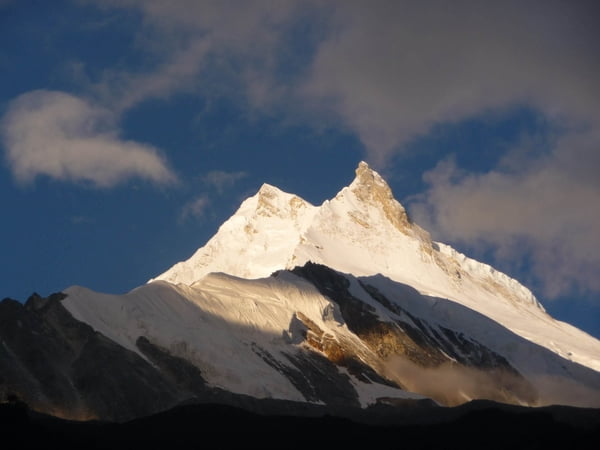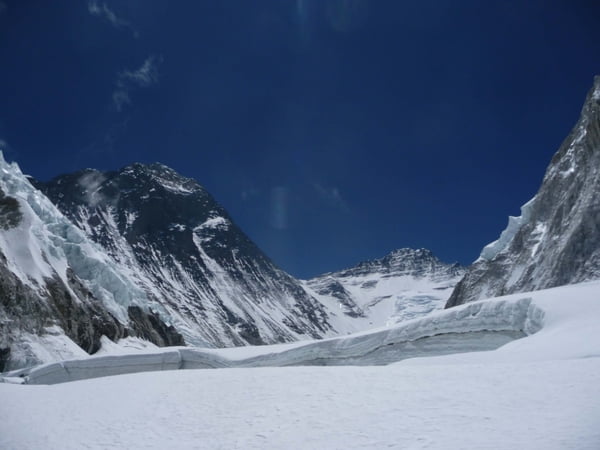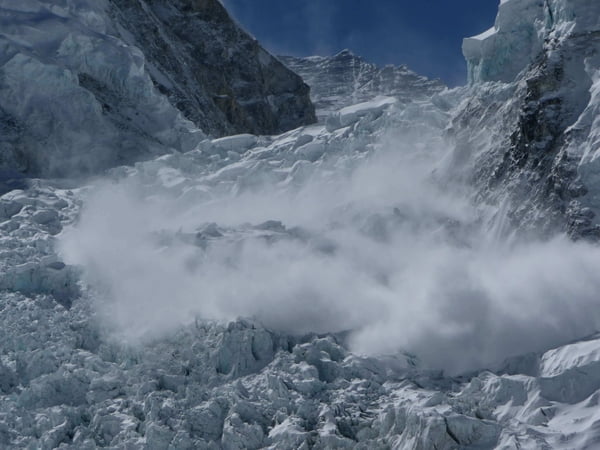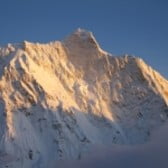
Daily Mountain
48 years, Australia
Why we climb mountains
Disenchantment with the material world pushes us to the Himalaya to reconnect with Nature.
Mountaineers have been asked why they climb mountains for as long as big mountains have been climbed. But for Himalayan and other Native peoples around the world, the question is ‘Which deity lives up there?’
Many mountaineers are not as spiritual anymore, and their relationship with high mountains is more ambiguous. The ancestors of Western civilisation in ancient Greece imagined that gods lived on mountain tops. Alas, sacredness today is a bit outdated.
 All photos: DAMIEN FRANCOIS
All photos: DAMIEN FRANCOIS
Although traditions linked to mountain spirits are still alive, many of us have lost the connection to that specialness of what some call ‘Creation’, or ‘Nature’, and its powers which humans used to personify in the form of deities. Hence, disenchantment with the material world pushes many of us mountaineers to the Himalaya to reconnect with Nature.
Ever since Nietzsche wrote ‘God is dead and we killed him’, everything pertaining to the divine and the mystical has become a bit complicated. Could it be that the earth’s highest elevations have now somehow become the playground of not just alpinists and geologists but also of philosophers?
After all, Nietzsche wrote: ‘Philosophy, as I have understood it hitherto is a voluntary retirement into regions of ice and mountain peaks’. Being a philosopher and mountaineer, I attempt perilous climbs that lead to Julius Evola’s ‘meditations on the peaks’. Jack Kerouac and the Beat generation’s ‘urgency of life’ comes to mind where ‘It’ is the world within this phenomenal world I am living in, body and mind.
That is what I’m looking for, up there: a world-ambience made of simple things that stand in contrast to the sublime majesty of the surroundings. A gigantic natural theatre, where I feel every fibre in my body like nowhere else. Granted, what I feel is mostly pain. But no pain, no elevation, and no gain. The physical and mental efforts I have to make up there are intense, magnified by hypoxia, exhaustion, varying temperatures from super hot to super cold. Yes, I actually turned around at 7,800m on Everest on 17 May last year because of the heat.

But it is not just the body that suffers, but the mind which is on edge. Yet, as much as climbing at the highest elevations is physically excruciating, it is equally rewarding mentally. The higher you get the more a certain torpor brings out deep feelings. A paradox? No, this sluggishness leads not only to a simplicity of actions — one foot in front of the other — it is also a mental simplicity, or reduction.
‘When I’m up above 8,000m … all desires vanish, the anxiety, the dissatisfaction that I experience down there are gone,’ writes Marco Bianchi. A state of zen not through meditation but action.
The more fear and danger are part of the experience, the longer the feelings will remain. Robert McFarlane in Mountains Of The Mind: A History Of A Fascination: ‘We had talked about how much pleasure the fear had brought afterwards. And we talked as mountaineers always do, about how strange it is to risk yourself for a mountain, but how central to that experience is that risk and the fear it brings with it.’
Then, this song by Luc van Acker: ‘I want to feel the fear that’s in my heart, the fear in my heart that keeps telling me which way to turn.’ It is the good fear, the one that makes me do the right thing at the right moment.
Mountaineers are not enamored with danger, we are not suicidal. High-altitude mountaineering is actually the art of moving through danger and avoiding it. But sometimes it goes wrong. I survived the big 25 April 2015 earthquake at Everest Base camp that killed 18 people.
‘Time doesn’t stop or slow down when you are in danger. Everything happens as fast. It’s just that – provided we survive them – we subject these periods of time to such intense retrospective scrutiny that we come to know them more fully, more exactly. We see them in freeze-frame,’ writes McFarlane.

Yes, everything is more intense, up there, especially the hardships. Yet, the body ‘uplifts’ the mind, and vice-versa. Body and mind, this is what the humanimal really is. The paradigm may be defined by the human ability to displace oneself mentally in space and time, but it is ‘conquistadors of the useless’ (Lionel Terray) who are actually climbing where no other will venture. Only the fiercest animal on the planet, the infamous wolverine (gulo gulo), seems to share this passion for climbing big hills for no other reason than hard-earned pleasure.
Unlike speed-climbers I do not seek to set up new records and certainly do not climb to deconstruct the laws of elementary physics. I rejoice in the simplicity of life and of what I do, but I am not interested in faster, faster, faster. This is a Western illusion which is rooted in the false notion that ‘progress’ is linear and always leads to something ‘better’.
Maybe the real reason why we venture up there is to ‘systematically rearrange the senses’ to paraphrase Rimbaud. Fear and danger dynamise existence, you live more consciously where there are no machines and buttons, no double clicks. It is back to fundamentals, as Friedrich Nietzsche, wrote: ‘To live at all means to live in danger.’
Damien Francois is a climber and author of The Holy Mountains of Nepal. His Everest climb this spring will be his 19th expedition in Nepal.
This article first appeared on http://www.nepalitimes.com. The original can be read here.





